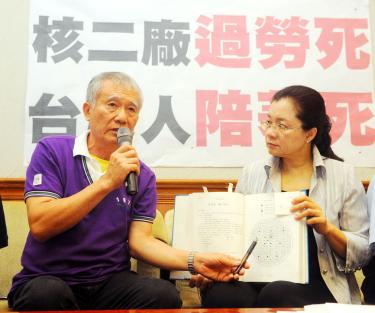Cracks of up to 30cm have been found on the core shroud of the No.1 reactor at the idled Guosheng Nuclear Power Plant in Wanli District (萬里), New Taipei City (新北市), an Atomic Energy Council official has confirmed.
Civic groups yesterday warned against reactivating the plant.
In addition to unsettled concerns about cracked anchor bolts at the reactor, Green Consumers Foundation chairman Jay Fang (方儉) revealed that two cracks were found on welded parts of the core shroud, which Fang said could lead to disaster if the reactor is reactivated without repairs.
Deputy Director of the Atomic Energy Council’s (AEC) Department of Nuclear Regulation Chen Yi-pin (陳宜彬) was quoted by the Chinese-language Liberty Times (the Taipei Times’ sister newspaper) yesterday as having confirmed on Sunday that the two long cracks were discovered during routine checkup and maintenance in March.
The core shroud is a large cylinder of circumferentially welded plates made of stainless steel, surrounding the reactor fuel core, which is composed of fuel rods assembled into bundles.
According to Chen, the cracks at the core shroud’s weld bead are located near where the most neutrons are emitted in the reactor core, and embrittlement of the weld bead is a result of stress corrosion from neutron exposure, adding that “it is a common problem of boiling-water reactors that has been known for over 20 years.”
Chen was also quoted as saying that cracks of 20cm were found at the first reactor six years ago and that even if holes were found on the core shroud, it would only affect the thermal efficiency as long as the reactor is still intact.
Lee Kuei-lin (李桂林), a retired Taiwan Power Co (Taipower) employee who had worked at the plant for 33 years, told a press conference yesterday that the Guosheng Nuclear Power Plant had had many instances of sudden emergency shut-downs and the thermal effect from a sudden drop in temperature from 300oC in the reactor core may be the real cause of the cracks.
As the top guide and core plate, which are welded onto the shroud, provide horizontal support for the fuel assemblies, the core shroud cracking may lead to instability or displacement of the guide and the plate, resulting in the misalignment of the fuel bundles, he said.
He added that control rods cannot be inserted between the fuel bundles if they are slightly misaligned, so a critical problem that could arise would be the loss of fuel core cooling capability.
The worst-case scenario that could, in turn, result from the inability to insert controls rods would be a core meltdown, he warned.
Democratic Progressive Party Legislator Tien Chiu-chin (田秋堇) said core shroud cracking was identified at Germany’s Wuergassen reactor (which, like the Guosheng No. 1 reactor, was also designed by General Electric Co) in 1994, and the cost of replacement was estimated at US$65 million, but the German government decided to retire the plant instead.
Similar cases of core shroud cracking were reported at many reactors in Japan in 2002, including the three reactors that had gone into meltdown at the Fukushima Dai-ichi nuclear plant last year, Green Citizens’ Action Alliance board member Lai Wei-Chieh (賴偉傑) said, adding that although the power shortage caused by the tsunami and earthquake were blamed for the accident, the possible impacts caused by the cracks should also be explored.
The groups urged the council not to allow Taipower to reactivate the reactor and put the lives of all the people living in greater Taipei under the threat of nuclear disaster.
In response, the AEC said in a press release yesterday evening that it has approved Taipower’s safety evaluation report on reactivating the first reactor after repairing the broken anchor bolts. It promised to monitor the crack or abnormal tremors of the reactor in the future and said the reactor can operate safely for another 18 months..
Source: Taipei Times - 2012/06/19





















